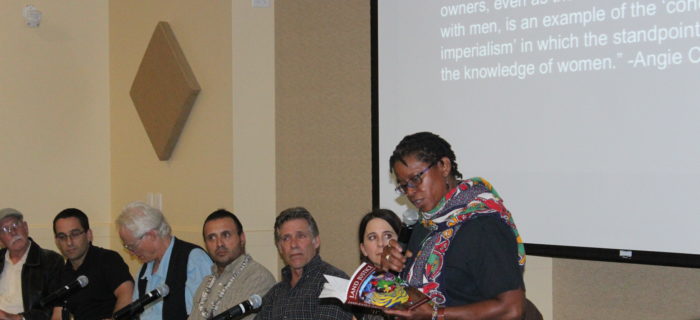Land Justice: The Grounding of the Food Movement
Land justice is the idea that people and communities that have been historically oppressed have a right to land and territory.
Food First’s latest book, “Land Justice: Re-imagining Land, Food and the Commons in the United States” is facilitating a national dialogue in frontline communities around the country. Launched recently in Berkeley, California with 10 of its 24 authors, the book is bringing together food and farm justice organizations in New York City, Boston, Baltimore, Washington, D.C., Atlanta, and more to discuss a topic long avoided in the United States: the question of land.
Perhaps this is because, as LaDonna Redmond points out in one of the book’s three prefaces, “The land is contested,” and always has been by those who have seen it expropriated out from under them.
So it should come as no surprise that this initiative does not stem from the nation’s 100 largest landholders—who together own over 34 million acres, an area greater that the states of Delaware, Maryland, Hawaii and West Virginia combined. The authors of this book are farmer-activists and scholars from African American, Latino, rural, and other frontline communities. They are women, young, new, and long-established farmers from both rural and urban areas across the continent. They share an unshakable belief that a sustainable and equitable food system is possible. They believe that the food movement can bring this about—if we start addressing land as the agrarian link to food justice.
Before a packed tent at the Baltimore Book Fair on Sunday, co-author Dr.Owusu Bandele linked land justice to the long tradition of Black Agrarianism, “African agrarian wisdom is an acknowledgement of the link between the natural and the spiritual. In African societies one finds a strict adherence to preserving, conserving and regenerating soil, water and the local eco-culture of life.”
In New York City’s East Village at Loisaida Cultural Center, food justice icon Karen Washington joined indigenous author Hartman Deetz on the stage. “The land is political,” she claimed, “But we have to understand that we have the political power.” Deetz, who also spoke in a Boston event organized by Grassroots International, hails from the Mashpee tribe of the Wampanoag peoples. They have struggled for the rights to their land in Mashpee, Connecticut since before the United States was founded, despite being the original peoples who made possible the first “Thanksgiving.”
In Sebastopol, California, Caitlin Hachmyer, farmer and organizer of the Foundations and the Future: Celebrating Women’s Leadership in the Food Movement symposium read passages from her chapter on beginning farmers:
“Moving from plot to plot, working with landowner after landowner in search of a connection I have not been able to find on rented land. My care for the land—my desire to not only sustain but regenerate it—is in constant conflict with the knowledge that I put money and more money into something I do not own. I work to build something that could slip through my fingers at any moment. An investment whose return I might never know… I am a new farmer.”
Stay in the loop with Food First!
Get our independent analysis, research, and other publications you care about to your inbox for free!
Sign up today!The book presentations are part of a new approach by Food First called Frontline Publishing, in which not only does this 42-year old “people’s think tank” collaborate directly with food and farm activists to amplify the voices of those on the front lines of today’s food and justice struggles, but brings these publications—and their authors—into direct dialogue with other communities and organizations for food justice. Land Justice book presentations are social events that delve deep into the issues of food, land, justice and power. Given the tenure of the political events rocking this country, the land question has come just in time. These books are part of a political process of reflection and dialogue for organizing and action. As co-editors Justine Williams and Eric Holt-Giménez put it:
“What is the role of land in social change? Ultimately it may be to bring us together on that irreducible terrain of hope from which all other struggles for food, livelihoods, water and environment emerge: the land.”
The book tour continues on September 28 in Atlanta, Georgia.


 Help Food First to continue growing an informed, transformative, and flourishing food movement.
Help Food First to continue growing an informed, transformative, and flourishing food movement.




